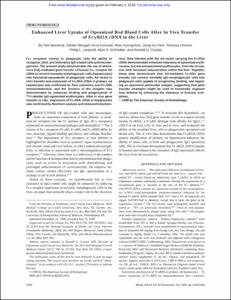KUMEL Repository
1. Journal Papers (연구논문)
1. School of Medicine (의과대학)
Dept. of Molecular Medicine (분자의학)
Enhanced Liver Uptake of Opsonized Red Blood Cells After In Vivo Transfer of FcγRIIA cDNA to the Liver
- Keimyung Author(s)
- Park, Jong Gu
- Department
- Dept. of Molecular Medicine (분자의학)
- Journal Title
- Blood
- Issued Date
- 1999
- Volume
- 94
- Issue
- 10
- Abstract
- Fcγ receptors convey to phagocytic cells the ability to recognize, bind, and internalize IgG-coated cells and microorganisms. The present study demonstrates the use of adenovirus (Ad)-mediated gene transfer of human Fcγ receptor IIA cDNA to convert normally nonphagocytic cells (hepatocytes) into functional equivalents of phagocytic cells. Ad vector in vitro transfer and expression of FcγRIIA cDNA in primary rat hepatocytes was confirmed by flow cytometry anti-FcγRIIA immunodetection, and the function of the receptor was demonstrated by enhanced binding and phagocytosis of (51)Cr-labeled IgG-opsonized erythrocytes. After in vivo gene transfer to rats, expression of FcγRIIA cDNA in hepatocytes was confirmed by Northern analysis and immunohistochemistry. Rats infected with the Ad vector carrying the FcγRIIA cDNA demonstrated enhanced clearance of opsonized erythrocytes, but not nonopsonized erythrocytes, from the circulation with increased sequestration within the liver. Together, these data demonstrate that Ad-mediated FcγRIIA gene transfer can convert normally IgG-nonphagocytic cells into phagocytic cells capable of recognizing, binding, and ingesting an opsonized particulate antigen, suggesting that gene transfer strategies might be used to transiently augment host defense by enhancing the clearance of immune complexes.
- Keimyung Author(s)(Kor)
- 박종구
- Publisher
- School of Medicine
- Citation
- Petr Bezdicek et al. (1999). Enhanced Liver Uptake of Opsonized Red Blood Cells After In Vivo Transfer of FcγRIIA cDNA to the Liver. Blood, 94(10), 3448–3455.
- Type
- Article
- ISSN
- 0006-4971
- Appears in Collections:
- 1. School of Medicine (의과대학) > Dept. of Molecular Medicine (분자의학)
- 파일 목록
-
-
Download
 oak-aaa-00644.pdf
기타 데이터 / 318.6 kB / Adobe PDF
oak-aaa-00644.pdf
기타 데이터 / 318.6 kB / Adobe PDF
-
Items in Repository are protected by copyright, with all rights reserved, unless otherwise indicated.